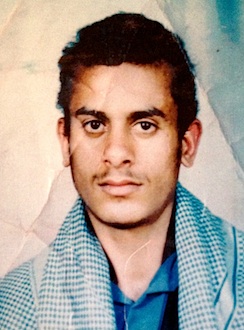Ten Yemenis Freed from Guantánamo, Given New Homes in Oman; Now 93 Men Remain
 As the disgraceful US prison at Guantánamo Bay begins its 15th year of operations, President Obama has been busy attempting to show that, with just one year left in office, he is determined to close the prison, as he promised to do on his second day in office back in January 2009, when he promised to close it within a year. Last month, we heard that 17 men would be released in January, and the releases began just days before the 14th anniversary of the opening of the prison with the release of two Yemenis in Ghana and the return to Kuwait of Fayiz al-Kandari, the last Kuwaiti in the prison. On the actual anniversary, a Saudi was returned home, and two days after the anniversary ten more Yemenis were released in Oman, Yemen’s neighbor, to add to the ten Yemenis sent to Oman last year.
As the disgraceful US prison at Guantánamo Bay begins its 15th year of operations, President Obama has been busy attempting to show that, with just one year left in office, he is determined to close the prison, as he promised to do on his second day in office back in January 2009, when he promised to close it within a year. Last month, we heard that 17 men would be released in January, and the releases began just days before the 14th anniversary of the opening of the prison with the release of two Yemenis in Ghana and the return to Kuwait of Fayiz al-Kandari, the last Kuwaiti in the prison. On the actual anniversary, a Saudi was returned home, and two days after the anniversary ten more Yemenis were released in Oman, Yemen’s neighbor, to add to the ten Yemenis sent to Oman last year.
David Remes, who represents three of the men sent to Oman, said it was “a particularly good fit for them,” as the New York Times described it. “I’m sure that they are ecstatic just leaving Guantánamo,” he said. “But it’s even better than that. They’ve been sent to Oman, an Arab country, whose language, culture and religion are their own. Oman is also one of Yemen’s neighbors, so their families will be able to visit them often.”
Three more releases — of unidentified prisoners to unidentified countries — are expected soon, and, after the release of the ten men to Oman, Lee Wolosky, the Special Envoy for Guantánamo Closure in the State Department, said, “We expect to be in a position to empty Guantánamo of all detainees who are currently approved for transfer by this summer.” Including the three men who are expected to be freed soon, Wolosky’s description currently applies to 34 of the 93 men still held — 25 since January 2010, who were approved for release by President Obama’s high-level, inter-agency Guantánamo Review Task Force, and nine in the last two years, by a new review process, the Periodic Review Boards. Read the rest of this entry »
Tariq Ba Odah, Hunger Strikes, and Why the Obama Administration Must Stop Challenging Guantánamo Prisoners in Court
 In June, I wrote an article, “Skeletal, 75-Pound Guantánamo Hunger Striker Tariq Ba Odah Seeks Release; Medical Experts Fear For His Life,” about the desperate plight of Tariq Ba Odah, a Guantánamo prisoner who has been on a hunger strike since 2007 and is at risk of death. His weight has dropped to just 74.5 pounds, and yet the government does not even claim that it wants to continue holding him. Over five and a half years ago, in January 2010, the high-level, inter-agency Guantánamo Review Task Force that President Obama established when he took office in 2009 to review the cases of all the prisoners still held at that time, concluded that he should no longer be held.
In June, I wrote an article, “Skeletal, 75-Pound Guantánamo Hunger Striker Tariq Ba Odah Seeks Release; Medical Experts Fear For His Life,” about the desperate plight of Tariq Ba Odah, a Guantánamo prisoner who has been on a hunger strike since 2007 and is at risk of death. His weight has dropped to just 74.5 pounds, and yet the government does not even claim that it wants to continue holding him. Over five and a half years ago, in January 2010, the high-level, inter-agency Guantánamo Review Task Force that President Obama established when he took office in 2009 to review the cases of all the prisoners still held at that time, concluded that he should no longer be held.
The task force approved 156 men for release, although Tariq was one of 30 placed in a category invented by the task force — “conditional detention,” made dependent on a perception that the security situation in Yemen had improved or “an appropriate rehabilitation program or third- country resettlement option becomes available,” as his lawyers described it.
Collectively, the whole of the US establishment has — with one exception — refused to repatriate any Yemenis approved for release since January 2010 (after a foiled terror plot was revealed to have been hatched in Yemen), although, since last November, the administration has been finding third countries willing to offer new homes to Yemenis approve for transfer — in part became of persistent pressure from campaigning groups. 18 Yemenis have so far been found homes in third countries — in Georgia, Slovakia, Kazakhstan, Estonia and Oman — so all that now ought to prevent Tariq Ba Odah’s release is if the US government proves unable to find a third country prepared to offer him a new home. Read the rest of this entry »












 Who's still at Guantánamo?
Who's still at Guantánamo?
